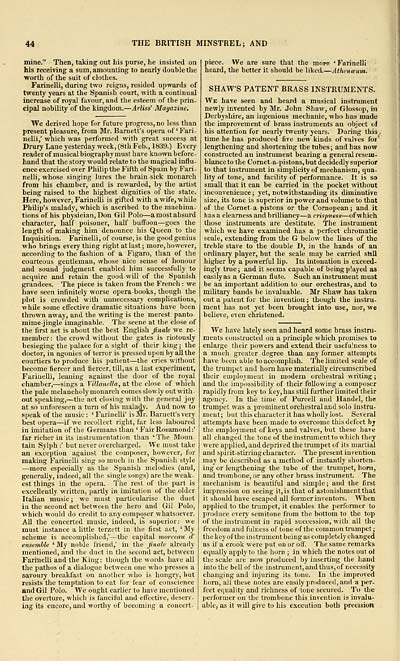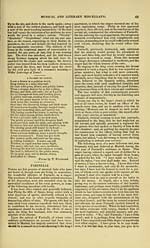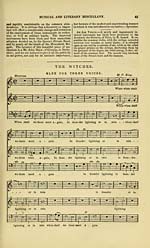Glen Collection of printed music > Printed music > British minstrel, and musical and literary miscellany
(52) Page 44
Download files
Complete book:
Individual page:
Thumbnail gallery: Grid view | List view

44
THE BRITISH MINSTREL: AND
mine." Then, taking out his purse, he insisted on
his receiving a sum, amounting to nearly double the
worth of the suit of clothes.
Farinelli, during two reigns, resided upwards of
twenty years at the Spanish court, with a continual
increase of royal favour, and the esteem of the prin-
cipal nobility of the kingdom. — Arliss' Maijazine.
We derived hope for future progress, no less than
present pleasure, from Mr. Barnett's opera of 'Fari-
nelli,' which was performed with great success at
Drury Lane yesterday week, (8th Feb., 1839.) Every
reader of musical biography must have known before-
hand that the story would relate to the magical influ-
ence exercised over Philip the Fifth of Spain by Fari-
nelli, whose singing lures the brainsick monarch
from liis chamber, and is rewarded, by the artist
being raised to the highest dignities of the state.
Here, however, Farinelli is gifted with a wife, while
Philip's malady, which is ascribed to the machina-
tions of his physician, Don Gil Polo — a most absurd
character, half poisoner, half buffoon — goes the
length of making him denounce his Queen to the
Inquisition. Farinelli, of course, is the good genius
who brings every thing right at last; more, however,
according to the fashion of a Figaro, than of the
courteous gentleman, whose nice sense of honour
and sound judgment enabled him successfully to
acquire and retain the good-will of the Spanish
grandees. The piece is taken from the French : we
have seen infinitely worse opera-books, tliough the
plot is crowded with unnecessary complications,
while some effective dramatic situations have been
thrown away, and the writing is the merest panto-
mime-jingle imaginable. The scene at the close of
the first act is about the best English finale we re-
member : the crowd without the gates is riotously
besieging the palace for a sight of their king ; the
doctor, in agonies of terror is pressed upon by all the
courtiers to produce his patient — the cries without
become fiercer and fiercer, till, as a last experiment,
Farinelli, leaning against the door of the royal
chamber, — sings a Villanella, at the close of which
the pale melancholy monarch comes slowly out with-
out speaking, — the act closing with the general joy
at so unforeseen a turn of his malady. And now to
speak of the music : ' Farinelli' is Mr. Barnett's very
best opera — if we recollect right, far less laboured
in imitation of the Germans than ' Fair Rosamond:'
far richer in its instrumentation tlian ' The Moun-
tain Sylph :' but never overcharged. We must talie
an exception against the composer, however, for
making Farinelli sing so much in the Spanish style
— more especially as the Spanish melodies (and,
generally, indeed, all the single songs) are the weak-
est things in the opera. The rest of the part is
excellently written, partly in imitation of the older
Italian music; we must particularise the duet
in the second act between the hero and Gil Polo,
which would do credit to any composer whatsoever.
All the concerted music, indeed, is superior: we
must instance a little terzett in the first act, ' My
scheme is accomplished,' — the capital nwrceau iV
ensemble ' My noble friend,' in the finale already
mentioned, and the duet in the second act, between
Farinelli and the King: though the words have all
the pathos of a dialogue between one who presses a
savoury breakfast on another who is hungry, but
resists the temptation to cat for fear of conscience
and Gil Polo. We ought earlier to have mentioned
the overture, which is lanciful and effective, deserv-
ing its encore, and worthy of becoming a concert-
piece. We are sure that the more •Farinelli
heard, the better it should be liked. — Athenteum.
SHAW'S PATENT BRASS INSTRUMENTS.
We have seen and heard a musical instrument
newly invented by Mr. John Shaw, of Glossop, in
Derbyshire, an ingenious mechanic, who has made
the improvement of brass instruments an object oi
his attention for nearly twenty years. During this ,
time he has produced five new kinds of valves for'
lengthening and shortening the tubes; and has now
constructed an instrument bearing a general resem-
blance to the Cornet-a-pistons, but decidedly superior
to that instrument in simplicity of mechanism, qua-
lity of tone, and facility of performance. It is so
small tliat it can be carried in the pocket without
inconvenience; yet, notwithstanding its diminutive
size, its tone is superior in power and volume to that
of the Comet-a-pistons or the Cornopean; and it
has a clearness and brilliancy — a crisjmess — of which
those instruments are destitute. The instrument
which we have examined has a perfect chromatic
scale, extending from the G below the lines of the
treble stave to the double D, in the hands of an
ordinary player, but the scale may be carried still
higher by a powerful lip. Its intonation is exceed-
ingly true; and it seems capable of being played as
easily as a German flute. Such an instrument must
be an important addition to our orchestras, and to
miUtary bands be invaluable. Mr Shaw has taken
out a patent for the invention ; though the instru-
ment has not yet been brought into use, nor, we
believe, even christened.
We have lately seen and heard some brass instru-
ments constructed on a principle which promises to
enlarge their powers and extend their usefulness to
a much greater degree than any former attempts
have been able to accomplish. The limited scale of
the trumpet and hom have materially circumscribed
their employment in modem orchestral writing ;
and the impossibility of their following a composer
rapidly from key to key, has still further limited their
agency. In the time of Purcell and Handel, the
trumpet was a prominent orchestral and solo instru-
ment; but this character it has wholly lost. Several
attempts have been made to overcome this defect by
tlie employment of keys and valves, but these have
all changed the tone of the instrument to which they
were applied, and deprived the trumpet of its martiiU
and spirit-stirring character. The present invention
may be described as a method of instantly shorten-
ing or lengthening the tube of the trumpet, horn,
and trombone, or any other brass instrument. The
mechanism is beautiful and simple; and the first
impression on seeing it, is that of astonishment that
it should have escaped all former inventors. When
applied to the trampet, it enables the performer to
pi'oduce every semitone from the bottom to the top
of the instrument in rapid succession, with all the
freedom and fulness of tone of the common trampet;
the key of the instrument being as completely changed
as if a crook were put on or ott'. The same remarks
equiilly apply to the horn ; in which the notes out of
the scale are now produced by inserting the hand
into the bell of the instrament, and tlius, of necessity
changing and injuring its tone. In the improved
horn, all these notes are easily produced, and a per-
fect equality and richness of tone secured. To the
performer on the trombone this invention is invalu-
able, as it will give to his execution both precision
THE BRITISH MINSTREL: AND
mine." Then, taking out his purse, he insisted on
his receiving a sum, amounting to nearly double the
worth of the suit of clothes.
Farinelli, during two reigns, resided upwards of
twenty years at the Spanish court, with a continual
increase of royal favour, and the esteem of the prin-
cipal nobility of the kingdom. — Arliss' Maijazine.
We derived hope for future progress, no less than
present pleasure, from Mr. Barnett's opera of 'Fari-
nelli,' which was performed with great success at
Drury Lane yesterday week, (8th Feb., 1839.) Every
reader of musical biography must have known before-
hand that the story would relate to the magical influ-
ence exercised over Philip the Fifth of Spain by Fari-
nelli, whose singing lures the brainsick monarch
from liis chamber, and is rewarded, by the artist
being raised to the highest dignities of the state.
Here, however, Farinelli is gifted with a wife, while
Philip's malady, which is ascribed to the machina-
tions of his physician, Don Gil Polo — a most absurd
character, half poisoner, half buffoon — goes the
length of making him denounce his Queen to the
Inquisition. Farinelli, of course, is the good genius
who brings every thing right at last; more, however,
according to the fashion of a Figaro, than of the
courteous gentleman, whose nice sense of honour
and sound judgment enabled him successfully to
acquire and retain the good-will of the Spanish
grandees. The piece is taken from the French : we
have seen infinitely worse opera-books, tliough the
plot is crowded with unnecessary complications,
while some effective dramatic situations have been
thrown away, and the writing is the merest panto-
mime-jingle imaginable. The scene at the close of
the first act is about the best English finale we re-
member : the crowd without the gates is riotously
besieging the palace for a sight of their king ; the
doctor, in agonies of terror is pressed upon by all the
courtiers to produce his patient — the cries without
become fiercer and fiercer, till, as a last experiment,
Farinelli, leaning against the door of the royal
chamber, — sings a Villanella, at the close of which
the pale melancholy monarch comes slowly out with-
out speaking, — the act closing with the general joy
at so unforeseen a turn of his malady. And now to
speak of the music : ' Farinelli' is Mr. Barnett's very
best opera — if we recollect right, far less laboured
in imitation of the Germans than ' Fair Rosamond:'
far richer in its instrumentation tlian ' The Moun-
tain Sylph :' but never overcharged. We must talie
an exception against the composer, however, for
making Farinelli sing so much in the Spanish style
— more especially as the Spanish melodies (and,
generally, indeed, all the single songs) are the weak-
est things in the opera. The rest of the part is
excellently written, partly in imitation of the older
Italian music; we must particularise the duet
in the second act between the hero and Gil Polo,
which would do credit to any composer whatsoever.
All the concerted music, indeed, is superior: we
must instance a little terzett in the first act, ' My
scheme is accomplished,' — the capital nwrceau iV
ensemble ' My noble friend,' in the finale already
mentioned, and the duet in the second act, between
Farinelli and the King: though the words have all
the pathos of a dialogue between one who presses a
savoury breakfast on another who is hungry, but
resists the temptation to cat for fear of conscience
and Gil Polo. We ought earlier to have mentioned
the overture, which is lanciful and effective, deserv-
ing its encore, and worthy of becoming a concert-
piece. We are sure that the more •Farinelli
heard, the better it should be liked. — Athenteum.
SHAW'S PATENT BRASS INSTRUMENTS.
We have seen and heard a musical instrument
newly invented by Mr. John Shaw, of Glossop, in
Derbyshire, an ingenious mechanic, who has made
the improvement of brass instruments an object oi
his attention for nearly twenty years. During this ,
time he has produced five new kinds of valves for'
lengthening and shortening the tubes; and has now
constructed an instrument bearing a general resem-
blance to the Cornet-a-pistons, but decidedly superior
to that instrument in simplicity of mechanism, qua-
lity of tone, and facility of performance. It is so
small tliat it can be carried in the pocket without
inconvenience; yet, notwithstanding its diminutive
size, its tone is superior in power and volume to that
of the Comet-a-pistons or the Cornopean; and it
has a clearness and brilliancy — a crisjmess — of which
those instruments are destitute. The instrument
which we have examined has a perfect chromatic
scale, extending from the G below the lines of the
treble stave to the double D, in the hands of an
ordinary player, but the scale may be carried still
higher by a powerful lip. Its intonation is exceed-
ingly true; and it seems capable of being played as
easily as a German flute. Such an instrument must
be an important addition to our orchestras, and to
miUtary bands be invaluable. Mr Shaw has taken
out a patent for the invention ; though the instru-
ment has not yet been brought into use, nor, we
believe, even christened.
We have lately seen and heard some brass instru-
ments constructed on a principle which promises to
enlarge their powers and extend their usefulness to
a much greater degree than any former attempts
have been able to accomplish. The limited scale of
the trumpet and hom have materially circumscribed
their employment in modem orchestral writing ;
and the impossibility of their following a composer
rapidly from key to key, has still further limited their
agency. In the time of Purcell and Handel, the
trumpet was a prominent orchestral and solo instru-
ment; but this character it has wholly lost. Several
attempts have been made to overcome this defect by
tlie employment of keys and valves, but these have
all changed the tone of the instrument to which they
were applied, and deprived the trumpet of its martiiU
and spirit-stirring character. The present invention
may be described as a method of instantly shorten-
ing or lengthening the tube of the trumpet, horn,
and trombone, or any other brass instrument. The
mechanism is beautiful and simple; and the first
impression on seeing it, is that of astonishment that
it should have escaped all former inventors. When
applied to the trampet, it enables the performer to
pi'oduce every semitone from the bottom to the top
of the instrument in rapid succession, with all the
freedom and fulness of tone of the common trampet;
the key of the instrument being as completely changed
as if a crook were put on or ott'. The same remarks
equiilly apply to the horn ; in which the notes out of
the scale are now produced by inserting the hand
into the bell of the instrament, and tlius, of necessity
changing and injuring its tone. In the improved
horn, all these notes are easily produced, and a per-
fect equality and richness of tone secured. To the
performer on the trombone this invention is invalu-
able, as it will give to his execution both precision
Set display mode to: Large image | Transcription
Images and transcriptions on this page, including medium image downloads, may be used under the Creative Commons Attribution 4.0 International Licence unless otherwise stated. ![]()
| Special collections of printed music > Glen Collection of printed music > Printed music > British minstrel, and musical and literary miscellany > (52) Page 44 |
|---|
| Permanent URL | https://digital.nls.uk/91435569 |
|---|
| Description | Scottish songs and music of the 18th and early 19th centuries, including music for the Highland bagpipe. These are selected items from the collection of John Glen (1833 to 1904). Also includes a few manuscripts, some treatises, and other books on the subject. |
|---|
| Description | The Glen Collection and the Inglis Collection represent mainly 18th and 19th century Scottish music, including Scottish songs. The collections of Berlioz and Verdi collected by bibliographer Cecil Hopkinson contain contemporary and later editions of the works of the two composers Berlioz and Verdi. |
|---|

